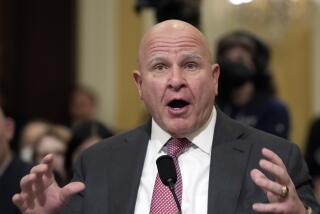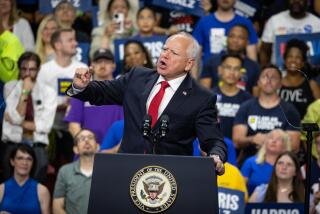Another Retired General Joins Battalion of Rumsfeld Critics
WASHINGTON — The White House voiced support for Defense Secretary Donald H. Rumsfeld on Thursday even as the ranks of retired senior generals calling for his resignation grew.
Retired Army Maj. Gen. Charles H. Swannack Jr., who commanded the 82nd Airborne Division in Iraq shortly after the toppling of Saddam Hussein, became the fifth general involved in Iraq policy to call for Rumsfeld to resign, citing his handling of the war.
Swannack, like the other generals, criticized Rumsfeld’s management style.
The Defense secretary “has micromanaged the generals” commanding troops in Iraq, Swannack said.
He added that Rumsfeld had “culpability” for the detainee abuse scandal at Iraq’s Abu Ghraib prison, and that he had failed to acknowledge his mistakes.
“I really believe that we need a new secretary of Defense because Secretary Rumsfeld carries way too much baggage with him,” Swannack said in an interview with CNN.
White House Press Secretary Scott McClellan declined to directly address the charges made by Swannack and the other retired generals, and pointed to recent statements by Marine Gen. Peter Pace, chairman of the Joint Chiefs of Staff, supporting Rumsfeld.
Pace insisted that Rumsfeld was open to listening to his senior military leaders, McClellan said.
“The president believes Secretary Rumsfeld is doing a very fine job during a challenging period in our nation’s history,” McClellan said. “We are a nation at war, and we are a nation that is going through a military transformation. Those are issues that tend to generate debate and disagreement, and we recognize that.”
The criticism of Rumsfeld has spurred debate within the military about the propriety of retired generals speaking out against their former civilian bosses so soon after leaving active service.
Some have complained that Rumsfeld has not tolerated differing viewpoints; others have said that Rumsfeld is willing to debate as long as officers come prepared to argue vigorously.
Lawrence DiRita, a senior aide to Rumsfeld, insisted Thursday that the Defense secretary had engaged the military’s uniformed leadership more frequently than his predecessors, noting that Rumsfeld had met with top officers about 70 times this year.
“He sees them more than he sees his wife,” DiRita said. “I’m not aware of any general officer who’s looking for more time with the secretary of Defense.”
DiRita acknowledged that Rumsfeld frequently challenged assumptions of military leaders, but said that was part of the Defense secretary’s efforts to come up with the best solutions for problems in Iraq.
Swannack’s comments came a day after another officer who commanded a division in Iraq, retired Army Maj. Gen. John Batiste, called for Rumsfeld’s resignation for failing to show respect for the military’s leaders.
Also Thursday, retired Army Maj. Gen. John Riggs, who once headed an Army task force to transform the service’s structure and weapons systems, said Rumsfeld should step down, citing an “atmosphere of arrogance.”
Unlike the other high-ranking military critics to speak out recently, Riggs was not involved in the Iraq war. He left the military two years ago after a controversial Army decision to reduce his rank and force his retirement after an investigation found he created an “adverse command climate.”
Other retired officers involved in Iraq who have called for Rumsfeld to step down in recent weeks include Marine Lt. Gen. Gregory S. Newbold, former director of operations for the Joint Chiefs of Staff; Army Maj. Gen. Paul D. Eaton, head of training Iraqi forces in 2003; and Marine Gen. Anthony C. Zinni, the former head of U.S. Central Command.
More to Read
Get the L.A. Times Politics newsletter
Deeply reported insights into legislation, politics and policy from Sacramento, Washington and beyond. In your inbox three times per week.
You may occasionally receive promotional content from the Los Angeles Times.










